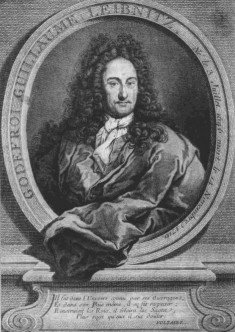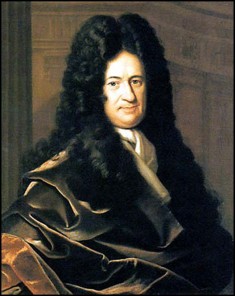Gottfried Leibniz was a German philosopher and mathematician. His mathematical achievements include the development of calculus at the same time as, though independently of, Isaac Newton. He also devised a number of mechanical calculators.
As a philosopher, Leibniz believed that the universe that humans inhabit represents the best of all possible worlds. His optimistic view on life informed his other work, in which he was among the pioneers in what later became known as analytic philosophy. Leibniz was a hugely prolific writer, and his complete works are still not completely collected.
Leibniz’s Early Years
Leibniz was born on July 1, 1648, in Leipzig. His father was a notable philosopher and the professor of Moral Philosophy at the city’s university. His mother likewise had an academic background, with her father having been a law professor. Gottfried’s father died when he was only five or six, after which he was brought up by his mother and uncle.
He was allowed to use the large library left by his father, and he became especially interested in historical and religious works. In 1661, he enrolled at the University of Leipzig; at this time, his studies would have focused on the scholastic philosophy that was still then popular, as well as a certain amount of Renaissance humanism.
Later Educational Years
While engaged in his studies, Leibniz came into contact with Jacob Thomasius. He was the driving force behind Leibniz’s deep respect for medieval and ancient philosophy. He also went on to be the supervisor for On the Principle of Individuation, Leibniz’s debut philosophical publication.
A thread that runs through Leibniz’s career is his attempt to find reconciliation between ancient and modern traditions of philosophy. After graduating, Leibniz undertook further study at the University of Altdorf. It was here that he published a dissertation that provided the first outline of what developed into logical calculus. Meanwhile, he was offered – but declined – a position on the law faculty.
More Mature Work
In 1667, having graduated as a Doctor of Law, Leibniz obtained a position under the Elector of Mainz. At his court, he wrote the Catholic Demonstrations, a series based on philosophical theology which attempted to bring together Catholicism and Protestantism. He also studied more modern philosophy than he had previously done, and in 1671, his New Physical Hypothesis was published.
Although he dedicated the work to the French Academy of Sciences and the British Royal Academy, Leibniz’s still relatively sketchy grasp of recent philosophical thinking meant that the treatise was not particularly well received. The following year, however, he was sent by the Elector to Paris on a diplomatic mission.
Leibniz’s Time in Paris
Paris, at this point in history, was the most important center of learning in Europe, and Leibniz’s four-year stay there revolutionized the quality of his work. He was able to meet with a number of the intellectual giants of his day, including Christiaan Huygens, who recognized potential in Leibniz and became something of a patron to him.
With Huygens’ tutelage in mathematics, physics, and philosophy, as well as an increasing understanding of the output of Pascal and Descartes, Leibniz began to produce truly world-shaking work. In particular, he sketched out the basis for what would become differential calculus; his work was now sufficiently well thought of that he was invited to the Royal Academy in London in 1673.
Leibniz’s Later Life
 Leibniz’s employer died while he was living in Paris, forcing him to take up employment with the Hanoverian ruler, Duke Johann Friedrich, in 1676. While on his way to take up the post, Leibniz visited the Dutch philosopher Baruch Spinoza in Amsterdam. They shared a conversation that ranged widely across physics and ethics in particular.
Leibniz’s employer died while he was living in Paris, forcing him to take up employment with the Hanoverian ruler, Duke Johann Friedrich, in 1676. While on his way to take up the post, Leibniz visited the Dutch philosopher Baruch Spinoza in Amsterdam. They shared a conversation that ranged widely across physics and ethics in particular.
Leibniz proposed a refinement to the ontological argument, a philosophical argument which provides reasons for the existence of God based on the organizational structure of the universe. After leaving, Leibniz spent the majority of the rest of his life in Hanover, apart from short trips abroad and a longer period undertaking historical research in Italy for the royal household.
After the death of the duke and his successor, Leibniz’s employer became Georg Ludwig, who in 1714 succeeded to the throne of Great Britain as King George I. The two men apparently had a somewhat strained relationship, although Leibniz’s carefully cultivated links with hundreds of European intellectuals prevented him from becoming too isolated.
Death and Legacy
Nevertheless, Leibniz’s final years were overshadowed by a vicious argument with Isaac Newton over who had first developed calculus, while back at court he was often ridiculed for his old-fashioned dress. Leibniz was so unpopular in England that the new king told him to stay in Germany rather than come with him to London. Two years later, on November 14, 1716, Leibniz died.
